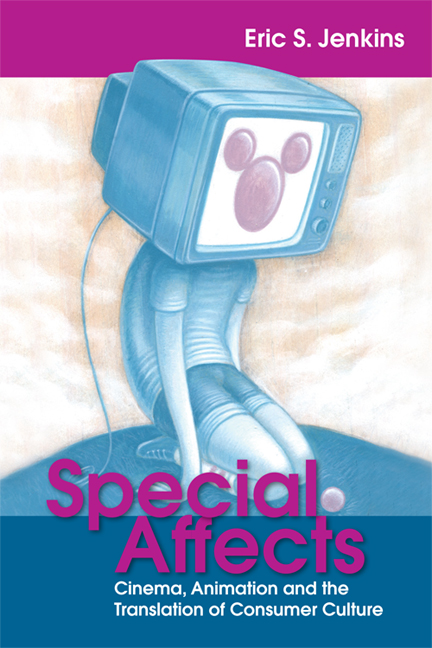Book contents
- Frontmatter
- Contents
- Acknowledgements
- List of Illustrations
- 1 Introduction
- 2 Astonishment and the Fantastic in Live-Action Cinema
- 3 Say Cheese! The Cinematic Lifestyle Consumer
- 4 Animation's Marvel and the Graphic Narrative Mode
- 5 Of Mice and Mimesis: The Wondrous Spark of Disney
- 6 Mutual Affection-Images and Daydreaming Consumers
- 7 The Disney Version of the American Dream
- 8 Walt and Wall-E in Control Society
- Movies Referenced in Special Affects
- Notes
- Index
8 - Walt and Wall-E in Control Society
Published online by Cambridge University Press: 05 August 2016
- Frontmatter
- Contents
- Acknowledgements
- List of Illustrations
- 1 Introduction
- 2 Astonishment and the Fantastic in Live-Action Cinema
- 3 Say Cheese! The Cinematic Lifestyle Consumer
- 4 Animation's Marvel and the Graphic Narrative Mode
- 5 Of Mice and Mimesis: The Wondrous Spark of Disney
- 6 Mutual Affection-Images and Daydreaming Consumers
- 7 The Disney Version of the American Dream
- 8 Walt and Wall-E in Control Society
- Movies Referenced in Special Affects
- Notes
- Index
Summary
Today, with the proliferation of digital devices and the computer's remediation of nearly every prior medium, the connection between media and consumerism may seem apparent, even obvious, a given part of the social environment. Just as consumption of digital devices and products such as games, websites and apps continues to expand into multi-billion dollar industries, so too does much consumption of more materialised commodities like toys and clothes occur via digital networks. Special Affects began with the recognition that consumer booms seem to accompany the emergence of every new medium, extending this connection between media and consumerism into the early and middle twentieth century, and has illustrated why such a fundamental connection exists. The virtual -abilities of media enable new relations with human folding capacities, constituting new modes – newly virtualised bodies. These modes facilitate the generation of creases, splits or fusions in the folds, allowing different parts of the body–mind to rub against one another, producing friction that, when reaching a heightened intensity, creates affective sparks. Those sparks, as they are habituated, become sources of value and are translated into consumer ideology and practice, making newly visible consumers and articulable commodities as well as new templates for the American Dream. That is, people seek to ‘make sense’ of these modal experiences and affects, in turn producing the cultural practices of consumerism as well as rhetorical understandings of that culture.
Special Affects demonstrates this conclusion through the oft-told case of classical Hollywood cinema and Disney's full-length features of the late 1930s and early 1940s. Disney and classical Hollywood translate the marvellous spark of early animation and the astonishing spark of early cinema, producing modes for the innervation of the fantastical spark of classical cinema and the wondrous spark of Disney. Although cinema and animation evoke other affections, the novelty of the marvellous, astonishing, fantastic and wondrous sparks helps explain the great attraction (and distress) of these media, an attraction responsible for the consumer booms that accompany their emergence. As people feel the astonishment of early cinema, the marvel of early animation, the fantastic spark of classical cinema, and the wonder of Disney animation, they make sense of those affections, translating them into regimes of consumer value and ideologies of consumerism. Doing so, the perceived consumers and commodities along with American Dream narratives become transformed.
- Type
- Chapter
- Information
- Special AffectsCinema, Animation and the Translation of Consumer Culture, pp. 189 - 206Publisher: Edinburgh University PressPrint publication year: 2014



